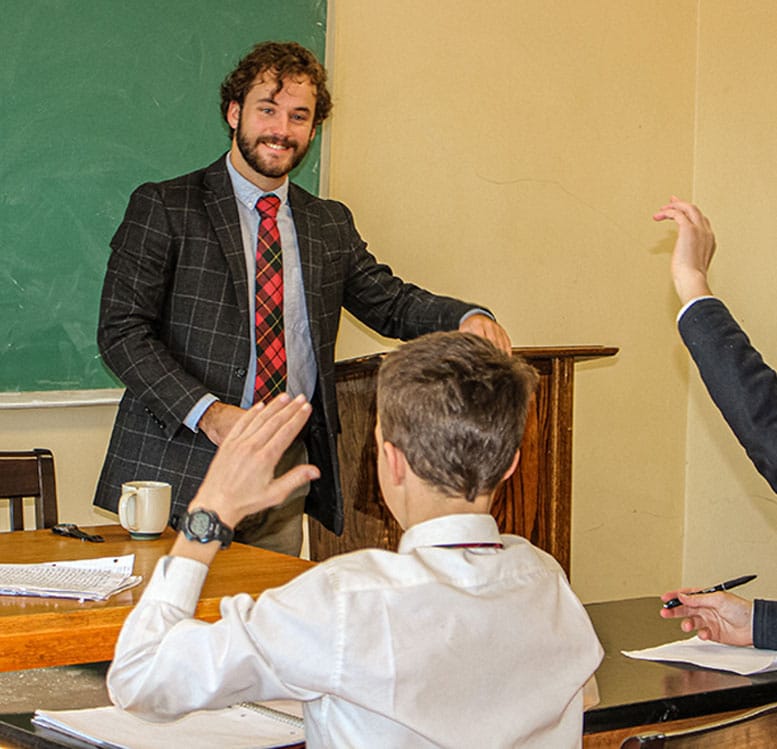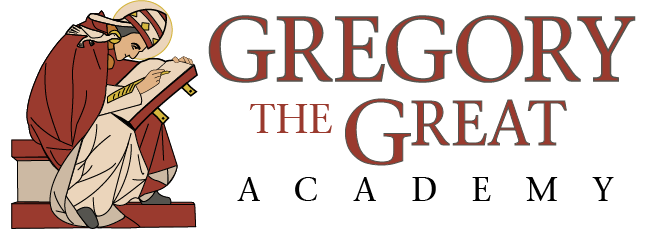
What Does Your Academic Program Look Like?
Freshman, 9th Grade
Latin I: Immersing students in the language of the Church and Western Civilization, and giving them the basics of grammar and vocabulary.
Literature I: Freshmen hit the books, the good books—Treasure Island, Robin Hood, Tom Sawyer—and learn by heart poems that awaken wonder and delight.
American History: Told in a narrative manner to capture the drama in stories of the great men and bold events comprising the discovery and founding of our nation.
Natural History I: Getting down and dirty with plant and animal life, experiencing firsthand the names of nature and appreciating their inherent beauty and order.
Algebra I: Freshmen begin to speak the language of numbers from 12x = 60 to -4y² +16y + 13 = 0, amassing a toolbox of foundational algebraic principles.
Music: Music is integral to a boy’s education, and our freshmen learn folk songs and study Gregorian chant.
Scripture I: Highlights the adventures of the Old Testament and the depth of God’s love, always yearning to take us back no matter how far we stray.
Sophomore, 10th Grade
Latin II: Sophomores master all declensions and conjugations as vital preparation for the Latin Mass and the Divine Office.
Literature II: A journey through the golden ages of Greek and Norse myth, giving a wondrous, stargazing view of gods and men, of virtue and heroism.
Ancient History: While students should know names, places, and dates, we present Greco-Roman history with the intrigue that gave birth to Western culture.
Agriculture Science: Sophomores unearth the fundamentals of agriculture, husbandry, and food production in book, field, barn, and kitchen.
Geometry: Math for men. Nothing trains the muscles of the mind so well as the beautiful and ennobling demonstrations of Euclid’s Elements.
Music: A fresh set of songs to sing, along with music history and theory to master.
Scripture II: Diving into the New Testament now, beginning with the Gospels and concluding with Revelation to show prophecies fulfilled by Jesus Christ.
Junior, 11th Grade
Latin III: Upper formers move on to more challenging readings about Roma Aeterna with Aeneas’ epic quest and Livy’s history of Rome’s founding.
Humanities I: The humanities humanize us with works of art in literature, history, and philosophy, such as Plato’s Apology, Homer’s Odyssey, and Sophocles’s Oresteia.
Natural History II: In a philosophic, imaginative approach to nature, students encounter the poetic and practical roles of man as steward of God’s creation.
Algebra II: Juniors prepare for advanced mathematical studies by honing skills of critical thinking and calculation which is the function of all mathematics.
Music: Moving on in music with a capella folk singing and polyphony in choir.
Church History: Launching out upon the story of the early Church and the holy heroes who shepherded the faithful through times of glory and trial.
Senior, 12th Grade
Latin IV: The challenges come thick and fast with readings from Livy and Cicero as students increase their word hoard and acquaintance with Roman culture.
Humanities II: Adventures through some of the great works that have attained immortality, including The Aeneid, Beowulf, The Canterbury Tales, and Hamlet.
Trivium: The trivium and quadrivium of the liberal arts, training the mind in the art of discourse, persuasion, and argument, culminating with a formal thesis.
Physics & Pre-Calculus: Demonstrations and laboratory work aid students in understanding how the abstract concepts of the physical world are concretely realized together with a preparatory course through the functions of Pre-Calculus.
Music: Enjoying the masters of folk song, and singing in the Gregorian Schola Cantorum in our own chapel and other local liturgies.
Theology: St. Augustine, St. Benedict, and St. Francis teach seniors the secrets of living our Faith, with Chesterton and Tolkien keeping things lively.
